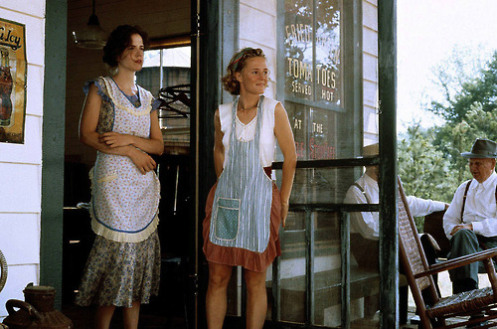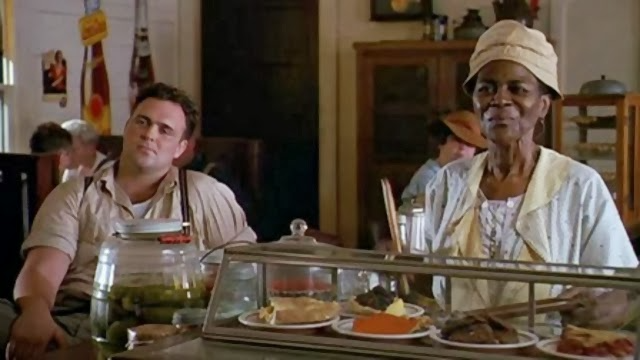
There are movies that entertain you — and then there are movies that transform you.
Fried Green Tomatoes is one of those rare gems that celebrates womanhood, aging, and the indomitable spirit of friendship. Released in 1991, this beloved classic remains a heartfelt ode to the power of connection, resilience, and self-discovery — especially for women who’ve lived long enough to know life doesn’t end when the world stops watching.
At its core, Fried Green Tomatoes is a story of two eras, two women, and one eternal truth: age doesn’t limit strength — it refines it.
The Timeless Story of Two Generations
The film beautifully weaves two storylines — one set in the 1920s and another in the 1980s.
We meet Evelyn Couch, a middle-aged woman trapped in the monotony of her life, who meets Ninny Threadgoode, a charming elderly woman in a nursing home. Ninny’s stories about Idgie and Ruth — two fearless women from her past — awaken something long lost inside Evelyn.
It’s more than storytelling; it’s a transfer of wisdom across generations.
Ninny Threadgoode: The Heart and Soul of Experience
Ninny, played by the extraordinary Jessica Tandy, embodies everything Older Women Week celebrates. She’s funny, warm, and full of life — but beneath her humor lies a treasure trove of strength. Through her, the film reminds us that aging doesn’t make a woman invisible; it makes her invaluable.
She’s proof that stories — and the women who tell them — hold communities together.

Evelyn Couch: The Woman Finding Herself Again
Kathy Bates’s portrayal of Evelyn is nothing short of masterful. Evelyn represents the countless women who’ve spent years caring for others but forgot to care for themselves. Through Ninny’s tales, Evelyn learns to reclaim her voice, her confidence, and her joy.
Her transformation from timid housewife to empowered woman is a metaphor for rebirth — one that resonates deeply with older women everywhere.
Idgie and Ruth: Defying Expectations, Then and Now
In Ninny’s stories, we meet Idgie Threadgoode (Mary Stuart Masterson) and Ruth Jamison (Mary-Louise Parker) — two women ahead of their time. Their friendship transcends social norms, gossip, and gender expectations of the 1920s South.
Their bond is fierce, loyal, and protective — a reminder that women have always been each other’s greatest source of power.
Celebrating Female Friendship at Every Age
What makes Fried Green Tomatoes so special is that it doesn’t glorify youth — it honors growth.
The film doesn’t just show young women overcoming challenges; it shows older women remembering, reflecting, and passing down courage.
Friendship, in this story, is not limited by age — it evolves, strengthens, and endures.
Breaking the Mold: Older Women as Heroes
Hollywood often sidelines older women. But in Fried Green Tomatoes, they take center stage. Ninny isn’t a background character — she’s the heartbeat of the film. Evelyn isn’t a damsel in distress — she’s her own savior.
It’s a cinematic rebellion — a celebration of women who are brave, imperfect, and beautifully real.
The Magic of Southern Storytelling
Set in Alabama, the film uses its Southern roots not just as a backdrop but as a living, breathing character.
Every scene — from the café to the dusty streets — drips with nostalgia. It’s storytelling the Southern way: full of flavor, humor, and heart, just like the fried green tomatoes themselves.
Food as a Metaphor for Love and Resilience
Food in Fried Green Tomatoes isn’t just a prop — it’s a language.
Cooking becomes a metaphor for healing and connection.
Just like frying green tomatoes — taking something raw and turning it into something golden — the women in the story transform pain into strength.
Why the Film Resonates With Older Women Today
More than three decades after its release, Fried Green Tomatoes still speaks to women navigating change, loss, and rediscovery.
It says, “You’re never too old to start again.”
It’s a reminder that your story doesn’t end at 40, 50, or 80 — it simply takes on new depth.
A Lesson in Self-Love and Courage
Evelyn’s journey teaches us something vital: you don’t need permission to live boldly.
When she finally screams, “Tawanda!” — it’s not just a funny scene. It’s a declaration of self-worth. It’s the sound of a woman remembering who she is.
That single moment has inspired generations of women to rediscover their power.
The Legacy of Female Empowerment
Fried Green Tomatoes didn’t just inspire audiences — it shifted cultural conversations about female strength.
It paved the way for later films like Thelma & Louise, Steel Magnolias, and Calendar Girls, which also celebrated the complexity and resilience of women at every age.
Older Women Week: Why It Matters
Celebrating Older Women Week means honoring the women who’ve lived, loved, and led before us.
It’s a time to recognize that beauty doesn’t fade — it evolves.
Movies like Fried Green Tomatoes remind us that every wrinkle tells a story and every decade carries wisdom.
The Timeless Message: You Are Enough
Whether you’re 25 or 75, the message remains the same: you are enough.
The film whispers it through every frame, every laugh, every tear.
It’s not about staying young — it’s about staying alive, passionate, and true to yourself.
Conclusion: A Toast to Every Woman Who’s Still Becoming
So here’s to the Ninnys, the Evelyns, the Idgies, and the Ruths — women who’ve fought quietly, loved deeply, and lived fully.
Fried Green Tomatoes isn’t just a movie; it’s a celebration of womanhood in all its beautiful, complicated stages.
It teaches us that aging is not the end — it’s the beginning of wisdom, courage, and a deeper kind of joy.
5 Unique FAQs About “Fried Green Tomatoes” and Older Women Empowerment
1. Why is Fried Green Tomatoes considered empowering for older women?
Because it portrays older women as storytellers, mentors, and catalysts for change — not side characters or afterthoughts.
2. What is the deeper message of the film?
It’s about rediscovering identity and purpose at any age, and how friendship can heal even the deepest wounds.
3. How does the film represent female friendship?
It celebrates female bonds as sacred, unbreakable, and essential to personal growth.
4. What lesson does Evelyn’s transformation teach?
That self-worth is not defined by others. You can always reinvent yourself — no matter your age.
5. Why does the movie remain relevant today?
Because its themes — courage, love, aging, and empowerment — are universal and timeless.
